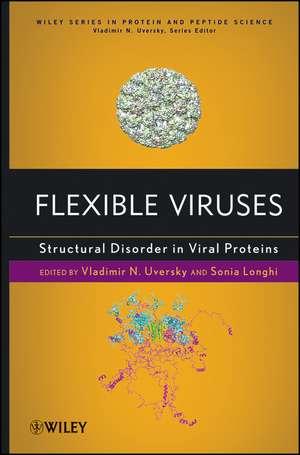Flexible Viruses – Structural Disorder in Viral Proteins: Wiley Series in Protein and Peptide Science
Autor V Uverskyen Limba Engleză Hardback – 27 feb 2012
Preț: 853.97 lei
Preț vechi: 1250.71 lei
-32% Nou
Puncte Express: 1281
Preț estimativ în valută:
163.46€ • 177.61$ • 137.39£
163.46€ • 177.61$ • 137.39£
Carte indisponibilă temporar
Doresc să fiu notificat când acest titlu va fi disponibil:
Se trimite...
Preluare comenzi: 021 569.72.76
Specificații
ISBN-13: 9780470618318
ISBN-10: 0470618310
Pagini: 520
Dimensiuni: 164 x 241 x 32 mm
Greutate: 0.89 kg
Editura: Wiley
Seria Wiley Series in Protein and Peptide Science
Locul publicării:Hoboken, United States
ISBN-10: 0470618310
Pagini: 520
Dimensiuni: 164 x 241 x 32 mm
Greutate: 0.89 kg
Editura: Wiley
Seria Wiley Series in Protein and Peptide Science
Locul publicării:Hoboken, United States
Public țintă
- Addresses one of today s leading global health threats, viral epidemics, as well as classic and debilitating diseases such as AIDS, herpes, lymphoma, hepatitis, etc.
- First systematic compilation of various aspects on the prediction and the experimental assessment of disordered regions within proteins from various viruses.
- Focuses on the mechanistic aspects of "folding–coupled–to–binding" and on the biological relevance of disordered regions and the structural transitions they undergo
- The authors are from leading research groups around the world; present case studies
- After analyzing the unique features of each class of viral proteins, future directions of research and disease management are presented
Cuprins
Notă biografică
VLADIMIR N. UVERSKY is an Associate Professor at the Department of Molecular Medicine at the University of South Florida (USF). He obtained his academic degrees from Moscow Institute of Physics and Technology (PhD in 1991) and from the Institute of Experimental and Theoretical Biophysics, Russian Academy of Sciences (DSc in 1998). He spent his early career working mostly on protein folding at the Institute of Protein Research and Institute for Biological Instrumentation, Russia. In 1998, he moved to the University of California Santa Cruz where for six years he was studying protein folding, misfolding, protein conformation diseases, and protein intrinsic disorder phenomenon. In 2004, he was invited to join the Indiana University School of Medicine as a Senior Research Professor to work on intrinsically disordered proteins. Since 2010, Professor Uversky is with USF, where he continues to study intrinsically disordered proteins and protein folding and misfolding processes. He has authored over 400 scientific publications and edited several books and book series on protein structure, function, folding and misfolding. SONIA LONGHI is a Director of Research at the Center for the National Scientific Research (CNRS). She obtained her academic degree (PhD) from the University of Milan in 1993. She then went to the Architecture and Function of Biological Macromolecules laboratory (AFMB, UMR 6098, CNRS and Aix-Marseille University) where she did postdoctoral work on protein crystallography. Since 2006, she has been heading the "Structural Disorder and Molecular Recognition" group within the AFMB laboratory. She has authored more than 70 scientific publications and edited a book on measles virus nucleoprotein and coedited, with Prof. Vladimir Uversky, a book entitled Instrumental Analysis of Intrinsically Disordered Proteins (Wiley).
Descriere
Biochemists, biophysicists, protein scientists, virologists, molecular biologists, biotechnololgists, pharmacologists and cell biologists, immunologists, scientists developing molecular medicine; pharmaceutical scientists .









